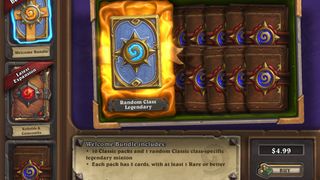Apple changes App Store 'loot box' policy so you know your odds
Apple? What are the odds?

Image credit: Blizzard
Few controversies have shaken the gaming industry this year quite like the row over loot boxes, which typically offer a supposedly randomized chance at winning in-game cosmetic or playable items in exchange for real-world cash.
Many critics see this as a form of gambling. Most game-related companies and platforms in the west have avoided direct action until today, but Apple, of all companies, has stepped in to force some transparency.
The new rule popped up today in Apple's App Store guidelines regarding payments.
"Apps offering 'loot boxes' or other mechanisms that provide randomized virtual items for purchase must disclose the odds of receiving each type of item to customers prior to purchase," the page now reads.
In essence, this means that you'll know what your chances of getting a particularly rare card in Hearthstone are before you open the card pack.
Loot boxes have been around in games for a while, but the issue blew up earlier this year after Star Wars Battlefront 2 implemented a particularly nasty system in which character progression was tied to these randomized rewards. In our own review, we called it the "attack of the microtransactions."
The backlash was swift and devastating during the early access period, leading to calls for new legislation to regulate loot boxes in some US states.
As far as Star Wars Battlefront 2 itself goes, the backlash led publisher Electronic Arts to pull the system entirely only a few hours ahead of the game's launch. Investors responded just as quickly, as Forbes reports, leading to a whopping 8.5% drop in EA's stock.
Following suit
Apple's new policy mirrors a similar policy we've already seen in China, where, as Polygon reported, the government there has been requiring that games disclose the odds for winning particular items through loot boxes since May.
Get daily insight, inspiration and deals in your inbox
Get the hottest deals available in your inbox plus news, reviews, opinion, analysis and more from the TechRadar team.
Which brings up an important point. Considering that China is a massive market for Apple now, it's possible that this is less a move of pure goodwill on Apple's part and more a way of keeping regulations for apps standard across the board.
It's currently not known what effect this policy will have on Apple's users, as, after all, many lotteries in the US are required to disclose the odds of winning as well and plenty of people still participate.
